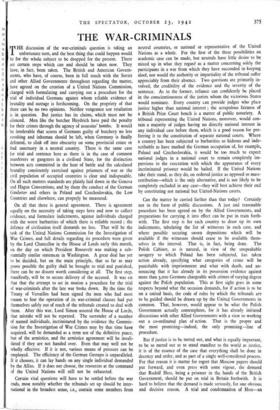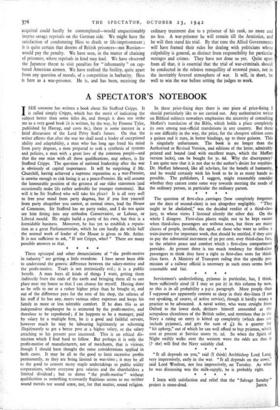THE WAR-CRIMINALS T HE discussion of the war-criminals question is taking
an unfortunate turn, and the best thing that could happen would be for the whole subject to be dropped for the present. There are certain steps which can and should be taken now. They have, in fact, been taken. The British and American Govern- ments, who have, of course, been in full touch with the Soviet and other Allied Governments throughout regarding the matter, have agreed on the creation of a United Nations Commission, charged with formulating and carrying out a procedure for the trial of individual Germans against whom reliable evidence of brutality and outrage is forthcoming. On the propriety of that there can be no two opinions. Neither vengeance nor retaliation is in question. But justice has its claims, which must not be silenced. Men like the butcher Heydrich have paid the penalty for their crimes through the agency of assassins' bombs. It would be intolerable that scores of Germans guilty of butchery no less revolting and inhuman should be left, when Germany is finally defeated, to slink off into obscurity on some provincial estate or find sanctuary in a neutral country. There is the same case for trial and sentence here as there is in the case of common murderers or gangsters in a civilised State, for the distinction between acts committed in the heat of battle and the calculated brutality consistently exercised against prisoners of war or the civil population of occupied countries is clear and indisputable. On all such matters standards are plainly laid down in the Geneva and Hague Conventions, and by them the conduct of the German Gauleiter and others in Poland and Czechoslovakia, the Low Countries and elsewhere, can properly be measured.
On all that there is general agreement. There is agreement equally on the necessity of taking steps here and now to collect evidence, and formulate indictments, against individuals charged with the worst barbarities of which there is reliable record ; the defence of civilisation itself demands no less. That will be the task of the United Nations Commission for the Investigation of War Crimes, and full details regarding its procedure were given by the Lord Chancellor in the House of Lords early this month, on the day on which President Roosevelt was making a sub- stantially similar statement in Washington. A great deal has yet to be decided, but on the main principle, that so far as may prove possible the guilty shall be brought to trial and punished, there can be no dissent worth considering at all. The first step, manifestly, will be to secure delivery of the accused. It was on that that the attempt to set in motion a procedure for the trial of war-criminals after the late war broke down. By the time the Treaty of Versailles had been signed the 'men who had most reason to fear the operation of its war-criminal clauses had put themselves safely out of reach of the tribunals created to deal with them. After this war, Lord Simon assured the House of Lords, that mistake will not be repeated. The surrender of a number of named individuals, incriminated by the evidence the Commis- sion for the Investigation of War Crimes may by that time have acquired, will be demanded as a term not of the definitive peace, but of the armistice, and the armistice agreement will be invali- dated if they are not handed over. Even that may well not be wholly effective. If it is not, various means of pressure can be employed. The efficiency of the German Gestapo is unparalleled. If it chooses, it can lay hands on any single individual demanded by the Allies. If it does not choose, the resources at the command of the United Nations will still not be exhausted.
Certain vital questions will have to be settled before the war ends, most notably whether the tribunals set up should be inter- national in the broadest sense, i.e., contain some members from neutral countries, or national or representative of the United Nations as a whole. For the first of the three possibilities an academic case can be made, but neutrals have little desire to be. mixed up in what they regard as a matter concerning solely the participants in a war from which they have succeeded in keeping aloof, nor would the authority or impartiality of the tribunal suffer appreciably from their absence. Two questions are primarily in- volved, the credibility of the evidence and the severity of the sentence. As to the former, reliance can confidently be placed in the conscientiousness of the jurists whom the victorious States would nominate. Every country can provide judges who place justice higher than national interest ; the scrupulous fairness of a British Prize Court bench is a matter of public notoriety. A tribunal representing the United Nations, moreover, would con- tain a majority of judges having no directly national interest in any individual case before them, which is a good reason for pre- ferring it to the constitution of separate national courts. Where a country has been subjected to barbarities so hideous and inde- scribable as have marked the German occupation of, for example, Poland and Czechoslovakia, it would be too much to expect national judges in a national court to remain completely im- pervious to the execration with which the appearance of every incriminated prisoner would be hailed. If the United Nations take their stand, as they do, on ordered justice as opposed to mass- retribution—which is the only alternative, and is not likely to be completely excluded in any case—they will best achieve their end by constituting not national but United-Nations courts.
Can the matter be carried farther than that today? Certainly not in the form of public discussions. A just and reasonable procedure has been agreed on by the Allied Governments, and preparations for carrying it into effect can be put in train forth- with. The first step is for each country to draw up its own indictments, tabulating the list of witnesses in each case, and where possible securing sworn depositions which will be available if the witnesses should cease to be available them- selves in the interval. That is, in fact, being done. The Polish Cabinet, as is natural, in view of the unspeakable savagery to Which Poland has been subjected, has taken action already, specifying what categories of crime will be punishable with imprisonment and what with death, and an- nouncing that it has already in its possession evidence against more than 3,000 Germans chargeable with crimes of varying degree against the Polish population. This at first sight goes in some respects beyond what the occasion demands, for if action is to be on a united basis, the code of rules by which the tribunals are to be guided should be drawn up by the United Governments in common. That, however, would appear to be what the Polish Government actually contemplates, for it has already initiated discussions with other Allied Governments with a view to working out a co-ordinated plan of action. That is the proper and the most promising—indeed, the only promising—line of procedure.
But if justice is to be meted out, and what is equally important, to be so meted out as to stand manifest to the world as justice, it is of the essence of the case that everything shall be done in decency and order, and as part of a single well-considered process. For that reason it is matter for regret that Moscow papers should put forward, and even press with some vigour, the demand that Rudolf Hess, being a prisoner in the hands of the British Government, should be put on trial in Britain forthwith. It is hard to believe that the demand is made seriously, for one obvious and decisive reason. A trial and condemnation of Hess—an acquittal could hardly be contemplated—would unquestionably inspire savage reprisals on the German side. We might have the satisfaction of condemning Hess to death or life-imprisonment ; it is quite certain that dozens of British prisoners—not Russian— would pay the penalty. We have seen, in the matter of chaining of prisoners, where reprisals in kind may lead. We have observed the Japanese threat to visit penalties for " inhumanity " on cap- tured American airmen. We have realised the futility, quite apart from any question of morals, of a competition in barbarity. Hess is here as a war-prisoner. He is, and has been, receiving the ordinary treatment due to a prisoner of his rank, no more and no less. A war-prisoner he will remain till the Armistice, and he will then stand his trial. By that time the Allied Governments will have framed their rules for dealing with politicians whose culpability is general, as distinct from responsibility for particular outrages and crimes. They have not done so yet. Quite apart from all that, it is essential that the trial of war-criminals should be conducted in the relative tranquillity of restored peace, not in the inevitably fevered atmosphere of war. It will, in short, be well to win the war before setting the judges to work.



























 Previous page
Previous page